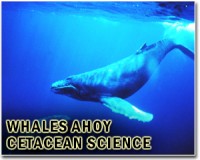| . |  |
. |
Washington (AFP) March 1, 2010 The main players in the feud over whaling gather Tuesday to decide whether to embrace a compromise that would permit outright hunting of the whales but seek to reduce the kill. Amid rising tensions between Japan and Australia over whaling, negotiators from key nations will meet behind closed doors through Friday in St. Pete Beach, a resort town next to St. Petersburg on Florida's Gulf coast. All sides will be scrutinizing the US position. President Barack Obama's administration opposes whaling but has yet to take a stand on the proposed compromise before the International Whaling Commission (IWC). In 1986, the IWC slapped a moratorium on commercial whaling, but Japan uses a loophole that allows "lethal research," while Norway and Iceland defy the ban entirely. The nations together have killed more than 30,000 whales since the moratorium. The compromise would bring all three nations' whaling practices under IWC control, including requiring that DNA samples be handed over for any "research" whaling, and aim to "significantly" reduce the catch over 10 years. Cristian Maquieira, chairman of the 88-nation IWC, called the approach a "paradigm shift" by bringing some form of consensus on whaling, saying the rancorous status quo "should not be regarded as an option." "I believe that with a committed desire to achieve a just outcome, we can make progress and resolve the outstanding issues," the Chilean diplomat said in submitting the draft last week. The informal Florida meeting does not have the power to approve the compromise but can recommend it to the next full-fledged IWC meeting, scheduled to take place in June in Morocco. But Australian Environment Minister Peter Garrett said the proposal "falls well short" of what his government would accept and has laid out a counter-proposal for Japan to end Antarctic Ocean whaling over five years. Australia has threatened legal action against Japan unless it commits to end its Antarctic hunts. Japan says whaling is part of its culture, but the Antarctic missions revolt whale-loving Australia and New Zealand. While not addressing the Antarctic, the IWC compromise would set up a whale sanctuary in the Southern Atlantic, where key players such as South Africa and Brazil oppose whaling. Japan has not commented in detail on the proposal, although Fisheries Minister Hirotaka Akamatsu said his government "will be flexible" in IWC talks. Environmental groups have been scathing over the proposal, with Greenpeace arguing that it effectively undoes the landmark 1986 moratorium credited with restoring stocks of the ocean giants. "This would take us right back to the 20th century of commercial whaling," said Phil Kline, an oceans campaigner at Greenpeace USA. "And after a 10-year period of doing this, there is absolutely nothing beyond that, so it just opens up the floodgates again," Kline said. Environmental campaigners, who had pinned their hopes on Obama becoming more active in international efforts against whaling, are seeking to build public pressure on the White House to side with Australia and reject the compromise. The Florida meeting will also look at a separate proposal by Denmark to allow indigenous people in Greenland to catch a small number of humpback whales. Nicolas Entrup of the Munich-based Whale and Dolphin Conservation Society said the European Union was divided on the proposal, with criticism from Germany and Britain. "We have never challenged the right of indigenous people in the Arctic to go whaling, but Greenland is basing their request on meat use per person in Greenland -- not just indigenous people in communities that go whaling," he said. "I think if you use this criteria and you start selling to supermarkets, then you are going into commercial whaling."
Share This Article With Planet Earth
Related Links Follow the Whaling Debate
 Study: Whaling speeds up to climate change
Study: Whaling speeds up to climate changePortland, Ore. (UPI) Feb 26, 2009 Whaling contributes to global climate change, U.S. scientists have found. A century of commercial whaling has released around 100 million tons of carbon dioxide into the atmosphere - that's equivalent to burning more than 50,000 square miles of temperate forest or 128,000 large sport-utility vehicles driving for 100 years. Those are the findings of a study by U.S. scientists fr ... read more |
|
| The content herein, unless otherwise known to be public domain, are Copyright 1995-2010 - SpaceDaily. AFP and UPI Wire Stories are copyright Agence France-Presse and United Press International. ESA Portal Reports are copyright European Space Agency. All NASA sourced material is public domain. Additional copyrights may apply in whole or part to other bona fide parties. Advertising does not imply endorsement,agreement or approval of any opinions, statements or information provided by SpaceDaily on any Web page published or hosted by SpaceDaily. Privacy Statement |